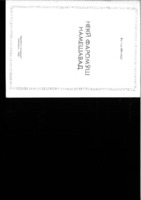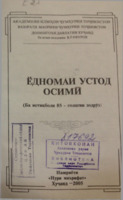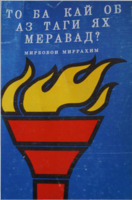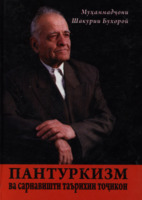Browse Documents (4 total)
Некӣ фаромӯш намешавад Kindness will not be forgotten
From the publisher: Устод Фаттоҳ Маҷидӣ баробари шеьргӯӣ дар наср ҳам қувва меозмояд. Ҳикояву воқеаҳои хурд-хурд менависад. Ӯ дар ин китоби "Некӣ фаромӯш намешавад" асосан дидаву шунидаҳои худро ба тарзи ҳикоятҳо ба қалам додааст, ки аксарияти онҳо аҳамияти калони ахлоқӣ, тарбиявӣ ва ҳатто таърихӣ доранд.
Fattoh Majidi (1931-) grew up in Samarqand and studied agriculture, eventually defending a doctorate and being appointed professor. He was also a poet. This short pamphlent consists of three parts. The first recounts episodes from his own life or of people he was close to; the second recounts episodes from literary and artistic life. The third consists of fictional or fictionalized vignettes.
Ёдномаи устод Осими (бо истикболи 85 солагии зодруз) Memories of Osimi
Muhammad Osimi (Osimov) 1920-1996, was a Tajik philosopher, educator, and government official. Born in Khujand, he was a graduate of the State University of Uzbekistan in Tashkent and saw service in Leningrad during the Great Patriotic War. He was the first rector of the Polytechnic Institute in Stalinabad (Dushanbe), and also served as Minister of Education. This selection is from a volume published on the 85th anniversary of his birth, but the scan only includes Osimi's own recollections about Sadriddin Ayni.
То ба кай об аз таги ях меравад? How Long will the Water Keep Flowing Under the Ice?
From the publisher: Ман сулоли "То ба кай об аз таги ях меравад?"-ро баъд аз дахуним сол такрор мекунам ва боз рӯ ба ҷомеа меорам. Ин мақолаҳо натиҷаи заҳматҳои хоксоронаи муаллиф дар роҳи худшиносии милиӣ мебошад. Ҳар яке аз онҳо боиси баҳсу вокунише дар ҷомаи Ҷумҳурӣ қарор гирифтаанд ва гувохи онанд, ки ин талошҳо дар роҳи Озодӣ ва Истиқлоли кишвар фаро расид.
Mirboboi Mirrahim (Mirbobo MIrrahimov) is a translator and expert in pre-Islamic religions. During perestroika, he became famous for his writings on the Tajik language and was one of the first writers to publicly discuss the status of Samarqand and Bukhara. He also became one of the cofounders of Rastokhez, Tajikistan's first independent political organization. This memoir, published during Mirrahim's exile in Iran, reprints a series of his articles, along with commentary and critique of the work of others.
Пантуркизм ва сарнавишти таръихии Тоҷикистон
Panturkism and the Rewriting of Tajik History
From the publisher: Китоби нави олими маъруф, академик Муҳаммадҷони Шакурии Бухороӣ «Пантуркизм ва сарнавишти таърихии тоҷикон» рисолаи «Фитнаи инқилоб дар Бухоро» ва силсиланигоштаҳои солҳои гуногуни муаллифро дар бар мегирад, ки посухест ба даъвоҳои бузургманишии олимону адибон, сиёсатмадорону фарҳангиёни туркгаро ва таҳрифгарони забону адабиёт ва таърихи фарҳанги тољик дар давраҳои гуногуни замони шуравӣ.
Muhammadjon Shakuri (Shakurov) (1924-2012) was a Tajik philologist and academician. He studied at the pedagogical institute in Dushanbe and later earned his kandidatskaia and doktorskaia degrees at the Institute of World Literature in Moscow. His professional home, however, remained the Rudaki Institute of Language and Literature in Dushanbe. In the late 1980s he became a leading figure in the campaign for the primacy of the Tajik language. This memoir revisits episodes from the late Soviet period related to perestroika and the reconsideration of the Soviet past, including the status of Samarqand and Bukhara. It also reproduces contemporary documents.



